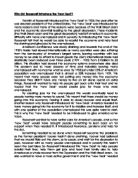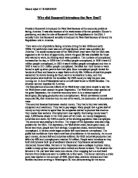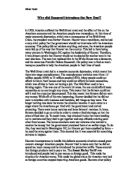GCSE History Coursework
Why Did Franklin D. Roosevelt introduce The New Deal?
In the following pages I shall answer the above question by analysing five main points. These are; Causes of the Wall Street Crash, economic consequences, social consequences, disillusionment of Herbert Hoover and the Republicans and what Roosevelt hoped the New Deal would accomplish.
When Roosevelt came to power in 1933 the country was in a state of complete calamity. The public were in urgent need of a directional leader. Herbert Hoover had given them no help in four years. “Too little, too late.” The Republicans refused to interfere resulting in an obvious Laissez-faire attitude, which meant a lack of federal support at a time when Americans were frantic and subsequently ineffectual policies followed e.g. RLC.
One of the first problems was the agricultural depression. It just made things worse. Over-production, unwelcome black share croppers and the ‘Okies’ kept adding to already apparent problems. In spite of all these complications there was still the huge issue that was the great depression. In fact it was so abysmal that it exacerbated the Agricultural Depression. The effects of this cataclysmic shadow were economic and social.
Tuesday, October 29th was Black Tuesday. It was the first domino to be pushed in the run up of the Great Depression. The Wall Street Crash was a tragedy as a result of a hidden America. The roaring twenties came to an abrupt end. But the causes were apparent immediately. The Agricultural industry was suffering. New machines were being used that decreased prices considerably. Black people and immigrants were either paid cheaply or laid off land. The older industry workers such as miners and textile trade were also paid cheaply with low wages. Families were earning ridiculously miniscule salaries (fifty percent earned less than two thousand dollars a year!), many lived below the poverty line - sixty percent - and less than ten percent of rural homes had electricity or mains water in the Tennessee Valley area. But mainly over-production lead to the crash. Because of booming business there was more demand for produce so there was more made. However the poor wages meant people couldn’t afford to buy goods hence requests lessened. Shares had been doing so well that people bought shares and made huge profits. The economy really was on the up until the experts began to worry. The once flourishing industries were making less and less meaning over-production was affected everyone. Inflation was the predictable ending. The increase of availability in credit meant people could afford to get what they wanted and put the worry of debt to the back of their mind, and this led to higher produce prices. But now the Americans couldn’t afford to buy the produce. The sudden drop in shares ended with the share owners selling their shares and panic ensued. Thus the crash. As Franklin D. Roosevelt once said,” It is common knowledge to take a method and try it. If it fails, admit it frankly and try another. But above all, try something.” Something that Herbert Hoover didn’t believe in, trying.







